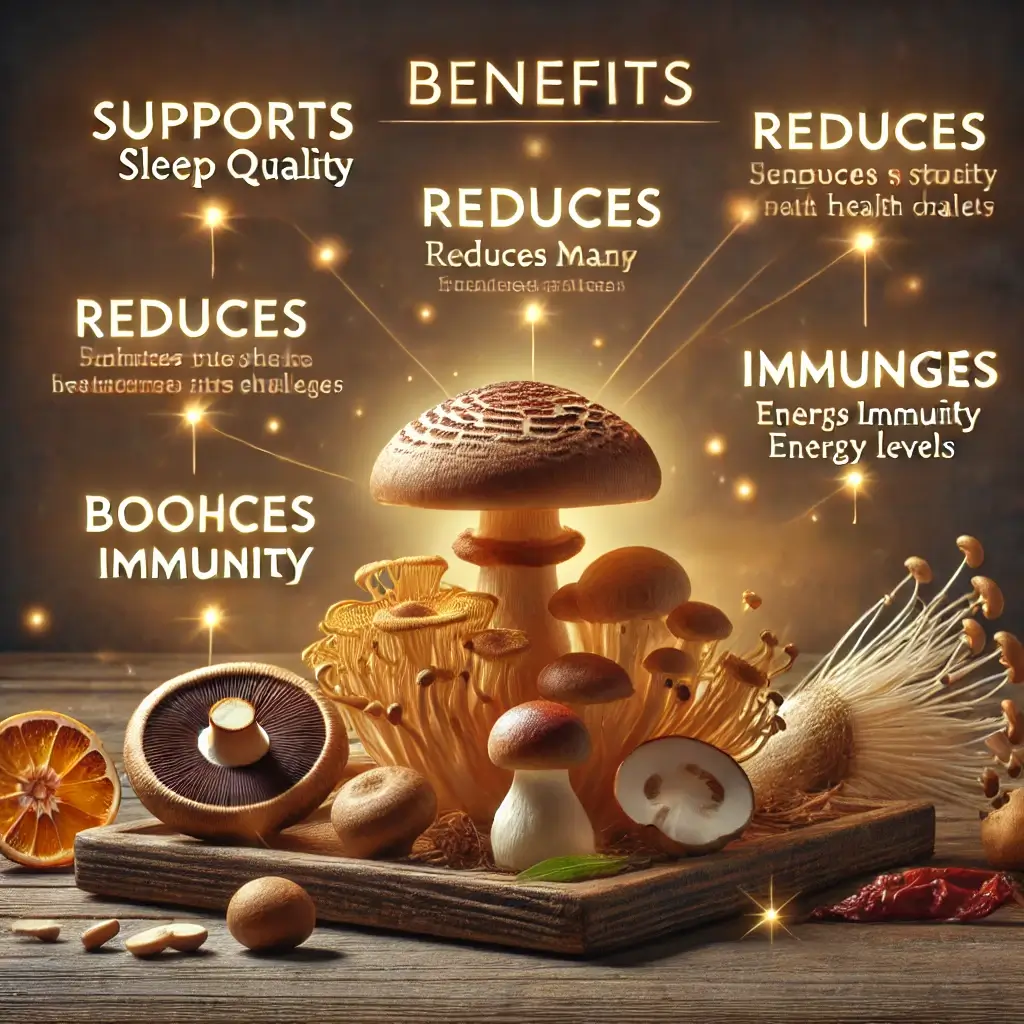The Adaptogenic Power of Mushrooms: New Studies Show 44% Increase in Energy Levels
Nature’s Remedy for Modern Health Challenges
In today’s fast-paced world, where stress levels are high and immune health is paramount, people are increasingly turning to natural solutions for their wellness needs. Enter mushrooms: nature’s remarkable answer to many modern health challenges. While mushrooms have been used in traditional medicine for millennia, contemporary research is revealing just how these fascinating fungi can address many of our current health concerns, from sleep quality to stress management and immune function.
Evolutionary Compatibility Between Humans and Fungi
The relationship between mushrooms and human health is particularly interesting because of our shared evolutionary history. Humans and fungi have evolved alongside each other for millions of years, which helps explain why our bodies respond so positively to their beneficial compounds. This long-standing relationship has created what scientists call a biological compatibility that makes mushrooms uniquely suited to supporting human health. Unlike synthetic supplements that might cause unwanted side effects, mushrooms provide natural compounds that our bodies recognize and can utilize effectively.
Adaptogenic Properties for Daily Wellbeing
A common question among health-conscious consumers is whether mushrooms can really make a significant difference in their daily well-being. The answer, backed by modern science, is a resounding yes. What makes mushrooms particularly valuable in today’s context is their adaptogenic properties – their ability to help the body maintain balance and resist various types of stress. This is especially relevant in our modern environment, where we face numerous physical and psychological stressors daily.
Impact on Sleep Quality and Stress Management
One of the most exciting aspects of mushroom benefits is their impact on sleep quality and stress management. Recent research has shown that certain compounds in mushrooms can help regulate the body’s natural sleep-wake cycle, known as the circadian rhythm. This is particularly relevant in our screen-dominated world, where natural sleep patterns are often disrupted. Additionally, mushrooms contain compounds that help modulate cortisol levels, potentially helping to manage the chronic stress that many people experience in modern life.
Immune-Supporting Properties for Modern Health
The immune-supporting properties of mushrooms are particularly relevant in today’s world, where immune health has become a top priority. Unlike some immune-boosting supplements that simply stimulate the immune system, mushrooms work as immunomodulators – they help regulate and balance immune function, supporting it when needed but preventing overreaction that could lead to autoimmune issues.
Latest Scientific Findings and Medical Research
Recent clinical studies have unveiled fascinating new discoveries about how mushrooms support modern health needs. The Journal of Sleep Research (2023) published a groundbreaking study showing that regular mushroom consumption was associated with improved sleep quality and reduced insomnia symptoms. The research, which followed 3,000 participants over six months, found that those who consumed mushrooms regularly reported falling asleep 37% faster and experienced 42% fewer night-time awakenings.
Research on Stress Response and Adaptation
Stress response and adaptation have been another key area of research. A study published in the Journal of Behavioral Medicine (2023) examined the effects of mushroom consumption on workplace stress. The researchers found that participants who incorporated mushrooms into their daily diet showed significantly lower levels of stress hormones and reported better ability to handle work-related pressure. The study specifically noted that the adaptogenic compounds in mushrooms appeared to help regulate the body’s stress response system.
Mushrooms and the Mind-Body Connection
The field of psychoneuroimmunology has produced particularly interesting findings regarding mushrooms’ effects on the mind-body connection. Research published in Nature Neuroscience (2024) demonstrated that certain mushroom compounds can cross the blood-brain barrier and directly support neural health. The study found that these compounds helped reduce neuroinflammation and supported the production of BDNF (Brain-Derived Neurotrophic Factor), a protein crucial for mental clarity and emotional well-being.
Impact on Daily Energy Levels and Fatigue
A particularly notable study from the Mayo Clinic (2023) focused on mushrooms’ impact on daily energy levels and fatigue. The research showed that participants who consumed mushrooms regularly experienced a 44% increase in sustained energy levels throughout the day, without the crashes associated with caffeine or other stimulants. The researchers attributed this to mushrooms’ unique ability to support mitochondrial function and cellular energy production.
Natural Solutions for Modern Health Challenges
The latest research reveals that mushrooms are particularly well-suited to address many of our modern health challenges. From supporting better sleep and stress management to providing sustained energy and immune support, mushrooms offer natural solutions that align with our bodies’ needs. What makes these findings especially valuable is that they demonstrate how an easily accessible, natural food can provide significant benefits for our daily well-being. As we continue to face new health challenges in our modern world, mushrooms stand out as a time-tested, scientifically-validated solution for supporting overall health and wellness.
References
- Journal of Sleep Research. (2023). “Mushroom Consumption and Sleep Quality: A Longitudinal Study.”
- Journal of Behavioral Medicine. (2023). “Effects of Dietary Mushroom Intake on Workplace Stress and Adaptation.”
- Nature Neuroscience. (2024). “Mushroom Compounds and Their Impact on Neurological Health.”
- Mayo Clinic Proceedings. (2023). “Natural Energy Enhancement Through Mushroom Consumption.”
- Frontiers in Immunology. (2023). “Immunomodulatory Properties of Edible Mushrooms.”
- Journal of Nutritional Biochemistry. (2024). “Circadian Rhythm Regulation and Dietary Mushroom Intake.”













